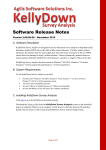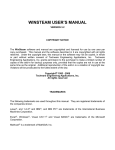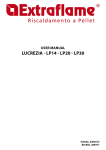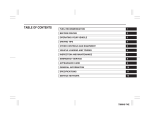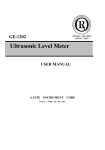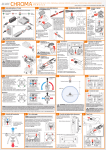Download Thermo Utilities v3.0, MS EXCEL Add-ins
Transcript
Thermo Utilities v3.0, MS EXCEL Add-ins Functions for properties of steam/water When you activate STMXL.XLA, you have access to all steam/water functions. By pressing fx button in MS Excel a dialog over all function comes up. Select "User Defined" and you will have a list over all user defined functions. When you pick a function, a brief description of the function appears at the bottom of the dialog box. If you press "Next", Excel will continue with a dialog box that asks for the necessary inputs for the function. In case, you press "Enter" button, you should fill all the parameters with numbers, cell reference, variable name and so on. These are the normal Excel functions behavior and is not specific for this program. If you need more help please see the on-line help of MS Excel or the user manual. The function names are compatible with the DLL version of steam properties. Those users who upgrade to this version from DLL version of steam properties will find several new functions. There are some simple rules that will help you to remind function names. Here, you have a complete list of functions for properties of steam and water. A print of this page will be helpful if you are new to this package. Function Description Comment STMCp (P,T)-->Cp, Heat capacity . STMCpSS (P)-->Cp for saturated steam . STMCpSW (P)-->Cp for saturated water . STMDv (V,T)-->Dv, Dynamic viscosity . STMPHQ (P,H)-->Q, Dryness fraction . STMPHS (P,H)-->S, Specific entropy . STMPHT (P,H)-->T, Temperature . STMPHV (P,H)-->V, Specific volume . STMPQH (P,Q)-->H, Specific enthalpy . STMPQS (P,Q)-->S . STMPQV (P,Q)-->V . STMPSH (P,S)-->H . Function Description Comment STMPSQ (P,S)-->Q . STMPST (P,S)-->T . STMPSV (P,S)-->V . STMPT (P)-->T, Saturation temperature Should work in demo version STMPTH (P,T)-->H . STMPTS (P,T)-->S . STMPTV (P,T)-->V . STMPVH (P,V)-->H . STMPVQ (P,V)-->Q . STMPVS (P,V)-->S . STMPVT (P,V)-->T . STMTc (V,T)-->Tc, Thermal conductivity . STMTP (T)-->P, Saturation pressure Should work in demo version STMTQH (T,Q)-->H . STMTQS (T,Q)-->S . STMTQV (T,Q)-->V . Functions for properties of air/flue gases Functions for properties of air/flue gases are based on equations accepted by ASHRAE and are compatible with formulations accepted by CIBSE (Chartered Institute of Building Services Engineers). When you activate AIRXL.XLA, you have access to all air/flue gases functions. By pressing button fx in MS Excel a dialog over all function comes up. Select "User Defined" and you will have a list over all user defined functions. When you pick a function, a brief description of the function appears at the bottom of the dialog box. If you press "Next", Excel will continue with a dialog box that asks for the necessary inputs for the function. In case, you press "Enter" button, you should fill all the parameters with numbers, cell reference, variable name and so on. These are the normal Excel functions behavior and is not specific for this program. If you need more help please see the on-line help of MS Excel or the user manual. The function names are compatible with the DLL version of Air and Exhaust Gas properties. Those users who upgrade to this version from DLL version of Air and Exhaust Gas will find several new functions. There are some simple rules that will help you to remind function names. Here, you have a complete list of functions for properties of Air and Exhaust Gas. A print of this page will be helpful if you are new to this package. Function Description Comment AirCpT (mc,Cp)-->T, Temperature . AirDpt (mc,P)--> Dpt, Dew point temperature . AirDv (mc,P,T)-->Dv, Dynamic viscosity . AirGC (mc)-->Gc, Gas constant Should work in demo version AirHT (mc,H)-->T . AirMM (mc)-->Mm, Molecular mass Should work in demo version AirST (mc,S)-->T . AirTc (mc,P,T)-->Tc, Thermal conductivity . AirTCp (mc,T)-->Cp, Heat capacity at constant P . AirTCv (mc,T)-->Cv, Heat capacity at constant V . AirTGamma (mc,T)-->Gamma = Cp/Cv . AirTH (mc,T)-->H, Specific enthalpy . AirTS (mc,T)-->S, Specific entropy . FlueCpT (Cp,%)-->T, Temperature . FlueDpt (P,%)--> Dpt, Dew point temperature . FlueDv (P,T,%)-->Dv, Dynamic viscosity . FlueGC (%)-->Gc, Gas constant Should work in demo version FlueHT (H,%)-->T . Function Description Comment FlueMM (%)-->Mm, Molecular mass Should work in demo version FlueST (S,%)-->T . FlueTc (P,T,%)-->Tc, Thermal conductivity . FlueTCp (T,%)-->Cp, Heat capacity at constant P . FlueTCv (T,%)-->Cv, Heat capacity at constant V . FlueTGamma (T,%)-->Gamma = Cp/Cv . FlueTH (T,%)-->H, Specific enthalpy . FlueTS (T,%)-->S, Specific entropy . GasDensity (P,T,Gc)-->Ro, Density Should work in demo version GasS (P,Gc,Satm)-->S at pressure, P Should work in demo version GasSAtm (P,Gc,S)-->Satm = S at atmospheric pressure Should work in demo version ScreenPS (DBT,WBT)-->PS, Percentage saturation . ScreenRH (DBT,WBT)-->RH, Relative humidity . ScreenSH (DBT,WBT)-->SH, Specific humidity . ScreenVWR (DBT,WBT)-->VWR, Volumetric water ratio . SlingPS (DBT,WBT)-->PS, Percentage saturation . SlingRH (DBT,WBT)-->RH, Relative humidity . SlingSH (DBT,WBT)-->SH, Specific humidity . SlingVWR (DBT,WBT)-->VWR, Volumetric water ratio . Fluid properties utility for use with Lee-Kesler method The current version of Lee-Kesler method support 467 different chemical compounds. You can use the utility software "fluidpro.exe" to view, edit or add new entries to our database. When you edit or add new entries, you should use the units mentioned in ellipses below. This limitation apply only to database entry, our software will use the default unit for input/output as you selected by "setunit.exe" as described before. The database supports the following: Normal freezing point (Tfp, K) Norma boiling point (Tb, K at 1 atmosphere) Critical temperature (Tc, K) Critical pressure (Pc, bar) Critical specific volume (Vc, cm3/mol) Critical compressibility factor (Zc, no dimension) Pitzer's acentric factor (Omega, no dimension) Dipole moment (DipM, debyes) Standard enthalpy of formation (DELHF, J/mol) Standard Gibbs energy of formation (DELGF, J/mol) A word of caution, in case you add/remove entries in the middle of database, the fluid index will be changed. Here is a screenshot of "fluidpro.exe". Functions for Lee-Kesler method These functions compute the thermodynamic properties of chemicals by using reduced pressure and temperature. When you activate LKXL.XLA, you have access to these functions. By pressing fx button in MS Excel a dialog over all function comes up. Select "User Defined" and you will have a list over all user defined functions. When you pick a function, a brief description of the function appears at the bottom of the dialog box. If you press "Next", Excel will continue with a dialog box that asks for the necessary inputs for the function. In case, you press "Enter" button, you should fill all the parameters with numbers, cell reference, variable name and so on. These are the normal Excel functions behavior and is not specific for this program. If you need more help please see the on-line help of MS Excel or the user manual. The function names are compatible with the DLL version of steam properties. Those users who upgrade to this version from DLL version of steam properties will find several new functions. There are some simple rules that will help you to remind function names. Here, you have a complete list of functions. A print of this page will be helpful if you are new to this package. Function Description Comment FluidIndex Fluid index in DB Should work in demo version DBTfb Normal freezing point Should work in demo version DBTb Norma boiling point Should work in demo version DBTc Critical temperature Should work in demo version DBPc Critical pressure Should work in demo version DBVc Critical specific volume Should work in demo version DBZc Critical compressibility factor Should work in demo version DBAF Pitzer's acentric factor Should work in demo version DBDM Dipole moment Should work in demo version DBDELHF Standard enthalpy of formation Should work in demo version DBDELGF Standard Gibbs energy of formation Should work in demo version LKPFT (P,F)->T, reduced temperature . LKPHT (P,H)->T, reduced temperature . LKPQF (P,Q)->F, fugacity-pressure ratio . LKPQH (P,Q)->H, residual enthalpy . LKPQS (P,Q)->S, residual entropy . LKPQZ (P,Q)->Z, compressibility factor . LKPST (P,S)->T, reduced temperature . LKPZT (P,Z)->T, reduced temperature . LKPT (P)->T, reduced saturation temperature Should work in demo version LKPTF (P,T)->F, fugacity-pressure ratio . Function Description Comment LKPTH (P,T)->H, residual enthalpy . LKPTS (P,T)->S, residual entropy . LKPTZ (P,T)->Z, compressibility factor . LKTP (T)->P, reduced saturation pressure . LKTQF (T,Q)->F, fugacity-pressure ratio . LKTQH (T,Q)->H, residual enthalpy . LKTQS (T,Q)->S, residual entropy . LKTQZ (T,Q)->Z, compressibility factor . Simple rules to remind function names All functions for steam/water properties start with STM then comes abbreviations for inputs needed and at last the output. Some examples are STMPTH needs P, pressure and T, temperature and calculates H, specific enthalpy, STMPHT needs P, pressure and H, specific enthalpy and calculates T, temperature. The same rule applies to functions for dry air, moist air and flue gases. Functions for dry and moist air start with Air and functions for flue gases start with Flue. All functions for dry/moist air need mc, moisture content. Therefore it has been omitted from the function's name. The same is with the flue gas functions all of them need the volumetric or mole fraction of the gases. Functions for screen hygrometer start with Screen and functions for sling hygrometer start with Sling . These functions calculate SH, specific humidity, RH, relative humidity, PS, percentage saturation and VWR, volumetric water ratio. Abbreviations: Cp: Specific heat capacity at constant pressure Cv: Specific heat capacity at constant volume Dv: Dynamic viscosity Gamma: Ratio of Cp/Cv GC: Gas constant H: Specific enthalpy mc: Moisture content MM: Molecular mass P: Pressure PS: Percentage saturation Q: Steam quality = dryness fraction = 1 - wetness fraction RH: Relative humidity S: Specific entropy SH: Specific humidity = moisture content T: Temperature Tc: Thermal conductivity V: Specific volume VWR: Volumetric water ratio Molecular Weight Calculator Molecular weight of any compound can be computed by using its chemical formula. This function supports all atoms in the periodic system. It should work even if you do not have any registration key. Fractional multipliers are allowed. Fractional numbers less than 1 should begin with 0. Macro development and error handling You can view our function prototypes and VBA interface by selecting "Tool", "Macro", "Visual Basic Editor" in Excel. By developing your own macros you can speed up your calculations and also make your own dialog boxes for input/output. Error handling/reporting for Steam/water functions All functions return large negative numbers in case of error. No function returns a negative number less than -1000 no matter what units are used. The returned values and reasons are: -1001: The pressure is outside the acceptable range specified in IFC formulation for Industrial use! 0.01 bar < P < 1000 bar -1002: The temperature is outside the acceptable range specified in IFC formulation for Industrial use! 0 C < T < 800 C -1003: Dryness fraction should be within the following limits: 0.0= < Q < = 1.0 -1004: Pressure of the wet steam may not be more than 221.0 bar (pressure at critical point is 221.2 bar) i.e. P <= 221.0 bar -1005: Temperature of the wet steam may not be more than 374.0 C (temperature at critical point is 374.15 C) i.e. T <= 374.0 C -1012: It is impossible to find a point with the specified pressure [P] and specific entropy [s]! -1013: It is impossible to find a point with the specified pressure [P] and specific volume [v]! -1014: It is impossible to find a point with the specified pressure [P] and specific enthalpy [h]! -1015: Inputs are not enough to determine the state of the steam or water. Pressure and temperature are too close to wet steam data. -1016: Pressure and temperature are too close to critical point. -1017: Specific volume is too small. Error handling/reporting for Air and flue gas functions All functions return large negative numbers in case of error. No function returns a negative number less than -20E+9 no matter what units are used. The returned values and reasons are: -21E+9: Moisture content, mc, is not acceptable! 0 =< mc < 0.30 -22E+9: Volumetric compositions should be within the interval zero and one and the sum must be one. -23E+9: Temperature should be within the following limits: -40 C < T < 1500 C -24E+9: It is impossible to find a temperature with the specified specific enthalpy. -25E+9: It is impossible to find a temperature with the specified specific entropy. -26E+9: It is impossible to find a temperature with the specified specific heat capacity. -27E+9: The wet bulb temperature is limited to: -40 C < T < 70 C -28E+9: The following condition should be satisfied: DryBulbT >= WetBulbT -29E+9: This combination of dry and wet bulb temperatures are not possible! -30E+9: Pressure is outside the acceptable range: 1. bar < P < 20 bar -31E+9: Gas constant is too small. Error handling/reporting for Lee-Kesler functions All functions return large negative numbers in case of error. No function returns a negative number less than -2000. No matter what units are used. The returned values and reasons are: -2001: The pressure is outside the acceptable range! 0.01 < Pr < 10 Pr = Reduced pressure = P/Pcr Pcr = Critical pressure P = Pressure -2002: The temperature is outside the acceptable range! 0.3 < Tr < 4.0 Tr = Reduced temperature = T/Tcr Tcr = Critical temperature T = Temperature -2003: Dryness fraction should be within the following limits: 0.0= < Q < = 1.0 -2004: Pressure of wet vapor may not be more than Pcr i.e. Pr < = 1.0 -2005: Temperature of wet vapor may not be more than Tcr i.e. Tr < = 1.0 -2012: It is impossible to find a point with the specified reduced pressure [Pr] and reduced specified entropy [sr]! -2013: It is impossible to find a point with the specified reduced pressure [Pr] and compressibility factor [Z]! Z=(V*P)/(R*T) V = Specific volume R = Gas Constant = 8.3144 J/(mol.K) = 10.732 psia.ft2/(lb-mol.R) -2014: It is impossible to find a point with the specified reduced pressure [Pr] and reduced specific enthalpy [h]! -2015: Inputs are not enough to determine the state of the fluid. Pressure and temperature are too close to wet vapor data. -2016: It is impossible to find a point with the specified reduced pressure [Pr] and reduced fugacity-pressure ratio [f]! -2020: Acentric factor is out of acceptable range. -0.5 < Af < 2.0 In case of questions or comments contact: [email protected] For more information, please visit: http://taftan.com/











